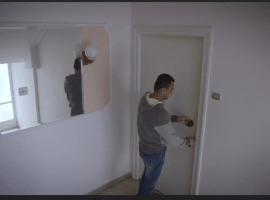Creating safe and friendly spaces, always trying to reflect the project’s philosophy of openness and participation.

Housing
The project seeks to map different housing actors within the municipality of Athens in order to select potential partners and to pilot exchange models to accommodate the beneficiaries of the program. The challenge is to provide affordable housing to refugees based on an exchange model which will combine the refugees’ skills with the local, pre-identified community needs and the households owners’ motives of participation in the exchange.
On 26 June, the housing component of our project was presented to key stakeholders of the Athenian housing-for-refugees ecosystem, during a “Sustainable Accommodation Workshop”. The presentation highlighted how the project stands out in a rather distinctive and innovative way, targeting to activate both the refugees and the city through a social exchange model.

Tackling the bureaucracy
The recruitment committee has been working since March 2018 on a highly demanding hiring process, in order to fill the key positions of the project team. The strict and rigid procedures for hiring in the Greek public sector create obstacles, reduce the flexibility and undermine the necessary innovative philosophy for a project as such. Within this context, a real effort is being made to fight the time-consuming procedures. This is an added value of innovation in public administration, extended beyond the project’s strategic objectives. The big challenge here is to enhance the openness and the transparency of the public sector in a productive and functional way.
Limbo Exit Lab
Priority has been given by the project team to designing the headquarters in a way that promotes team-building and at the same time gives a sense of security and friendliness to the beneficiaries. The common working space within the “Limbo Exit Lab”, not only will ameliorate the establishment of the team’s common identity, but it will also facilitate interaction between the project team, the trainers, the several experts and the attendees of the program, our beneficiaries. Construction work is underway in order to give to the space more natural light, while warm materials and colors were chosen to create a calm, friendly, productive and welcoming environment. Modular design was chosen for the furniture, to provide the flexibility needed for the project’s various needs, such as classrooms for the participants, the common spaces of the Limbo Exit Lab and the Team’s co-working spaces.
Next milestone
The Assessment of vacant housing spaces will identify incentives or potential exchange opportunities, especially non-financial forms that could motivate housing actors to participate in the program. Among other criteria, the pilot is based on property availability and condition, proximity to civic engagement opportunities, pre-existing links between housing actors and social solidarity economy actors.
A Technical Steering Group of experts on affordability and exchange models will start working on the merging of the two disciplines in order to ensure a holistic intervention.
Currently the project is beginning the mapping and the engagement with stakeholders and active citizens in the local level (neighborhood) so as to identify and list the needs of the Athenian neighborhoods.
Following these mappings, an innovative exchange model will be build based on the allocation between refugee skills, available housing and neighborhood needs.
The “Curing the Limbo” Project Team

 Integration of migrants and refugees
Integration of migrants and refugees

















